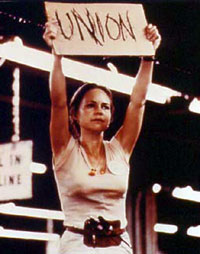Poor, silly Billy runs out of puff
Some things to think about from the Government’s new workplace relations package:
EXAMPLE
Billy is an unemployed job seeker who is offered a full-time job as a shop assistant by Costas who owns a clothing retail store in Canberra. The clothing store is covered by a federal award. The job offered to Billy is contingent on him accepting an AWA. The AWA Billy is offered provides him with the relevant minimum award classification wage and explicitly removes other award conditions.
As Billy is making an agreement under WorkChoices the AWA being offered to him must at least meet the Fair Pay and Conditions Standard.The AWA Billy is offered explicitly removes award conditions for public holidays, rest breaks, bonuses, annual leave loadings, allowances, penalty rates and shift/overtime loadings. Billy has a bargaining agent assisting him in considering the AWA. He understands the details of what is in the AWA and the protections that the Fair
Pay and Conditions Standard will give him including annual leave,
personal/carer's leave, parental leave and maximum ordinary hours of work. Because Billy wants to get a foothold in the job market, he agrees to the AWA and accepts the job offer.
Poor Billy. As Liam has noted, he’s stuck between a rock and a hard place. It becomes disgusting when you investigate half-truths circulated by the Government about the reforms – in this case, the myth that you are protected by law from being forced into signing an AWA, that it is a choice.
As can be deduced from poor Billy’s fate, the High court has ruled that making an AWA a condition of employment does not constitute ‘duress’ under the Act Never mind that in a depressed regional jobmarket where Billy’s skills as a wigmaker are redundant or non-existent, Billy may be forced by economic necessity to sign over his rights for a song. This apparently isn’t duress, which in the spirit of the Act is instead understood mainly in commercial terms as though the labour contract were a commercial contract, as though the employment relationship were the same as any other contractual relationship, as though the labour market were like any other market, as though selling your labour were the same as selling paperclips, as though, like a commercial entity, Billy didn’t need to eat or maintain non-commercially-essential personal relationships, and if his product, his labour, was substandard he should be allowed to fold, ensuring a healthy competitive market and a sloughing off of the dead weight of society.
So much for a society that refuses to separate labour from people, and that fights to protect the vulnerable. The Government’s promises that nobody can be forced to sign an AWA under law ring very hollow. Billy can’t even access the only remedy available to him, litigation through the court system, unless he has already signed the AWA. If he is merely in the process of being forced to sign it, there are no protections and no penalties, no friends to help him other than the union which frankly can’t do anything. The erroneously-named Employment Advocate does not have the power to investigate or bring the case until Billy himself realises he’s been hard done by. Even if Billy could prove that he had signed the damned thing under the weird and strict definition of ‘duress’, he would have to fork out his money to get penalties applied to the organisation, and he wouldn’t get ordered costs either. It would be a Pyrrhic principle fight, which he would probably lose anyway.


<< Home